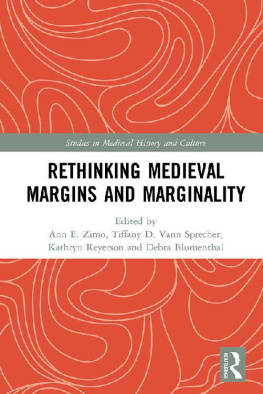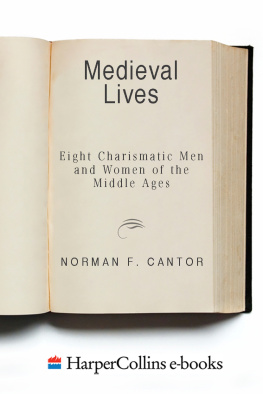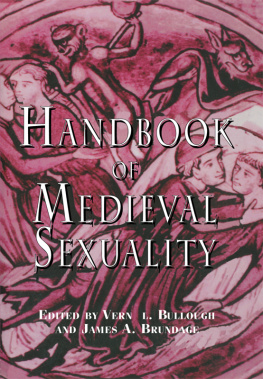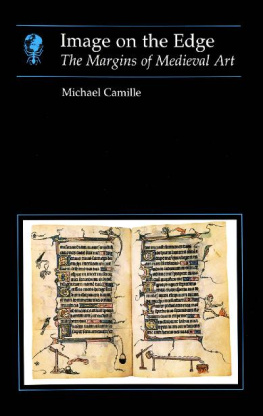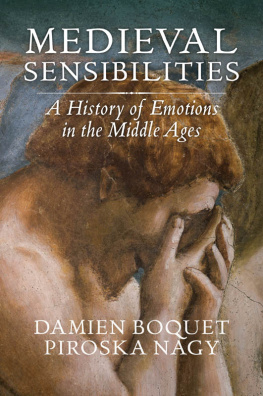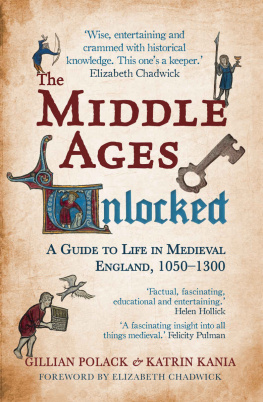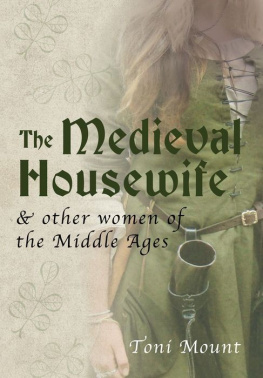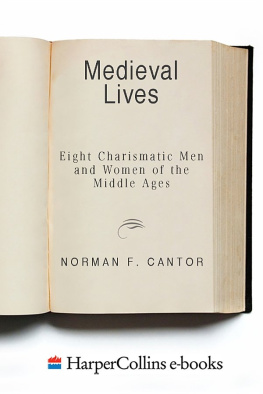Rethinking Medieval Margins and Marginality
Marginality assumes a variety of forms in current discussions of the Middle Ages. Modern scholars have considered a seemingly innumerable list of people to have been marginalized in the European Middle Ages: the poor, criminals, unorthodox religious, the disabled, the mentally ill, women, so-called infidels, and the list goes on. If so many inhabitants of medieval Europe can be qualified as marginal, it is important to interrogate where the margins lay and what it means that the majority of people occupied them. In addition, we scholars need to reexamine our use of a term that seems to have such broad applicability to ensure that we avoid imposing marginality on groups in the Middle Ages that the era itself may not have considered as such. In the medieval era, when belonging to a community was vitally important, people who lived on the margins of society could be particularly vulnerable. And yet, as scholars have shown, we ought not forget that this heightened vulnerability sometimes prompted so-called marginals to form their own communities, as a way of redefining the center and placing themselves within it. The present volume explores the concept of marginality, to whom the moniker has been applied, to whom it might usefully be applied, and how we might more meaningfully define marginality based on historical sources rather than modern assumptions. Although the volumes geographic focus is Europe, the chapters look further afield to North Africa, the Sahara, and the Levant acknowledging that at no time, and certainly not in the Middle Ages, was Europe cut off from other parts of the globe.
Ann E. Zimo is Assistant Professor of Humanities at the University of New Hampshire. Her research focuses on cultural interaction in the Eastern Mediterranean at the time of the crusades.
Tiffany D. Vann Sprecher has published articles on priests, women, and ecclesiastical regulation in Speculum, Journal of Medieval History, and Bulletin of the History of Medicine. She is currently an independent scholar as well as project manager at Beutler Ink, a digital marketing agency.
Kathryn Reyerson is Distinguished University Teaching Professor of History at the University of Minnesota and founding director of the Center for Medieval Studies. She has published widely on merchants and trade, and on women and gender. Her current research focuses on medieval Mediterranean piracy.
Debra Blumenthal is Associate Professor of History at the University of California at Santa Barbara. Her publications explore the history of slavery and race, as well as gender and cross-cultural relations in the medieval Mediterranean.
Studies in Medieval History and Culture
Recent titles include
The Charisma of Distant Places
Travel and Religion in the Early Middle Ages
Courtney Luckhardt
The Death Penalty in Late Medieval Catalonia
Evidence and Signification
Flocel Sabat
Church, Society and University
The Paris Condemnation of 1241/4
Deborah Grice
The Sense of Smell in the Middle Ages
A Source of Certainty
Katelynn Robinson
Travel, Pilgrimage and Social Interaction from Antiquity to the Middle Ages
Edited by Jenni Kuuliala and Jussi Rantala
Rethinking Medieval Margins and Marginality
Edited by Ann E. Zimo, Tiffany D. Vann Sprecher,
Kathryn Reyerson and Debra Blumenthal
Rethinking Medieval Margins and Marginality
Edited by Ann E. Zimo, Tiffany D. Vann Sprecher, Kathryn Reyerson and Debra Blumenthal

First published 2020
by Routledge
2 Park Square, Milton Park, Abingdon, Oxon OX14 4RN
and by Routledge
52 Vanderbilt Avenue, New York, NY 10017
Routledge is an imprint of the Taylor & Francis Group, an informa business
2020 selection and editorial matter, Ann E. Zimo, Tiffany D. Vann Sprecher, Kathryn Reyerson, Debra Blumenthal; individual chapters, the contributors.
The right of the editor to be identified as the author of the editorial material, and of the authors for their individual chapters, has been asserted in accordance with sections 77 and 78 of the Copyright, Designs and Patents Act 1988.
All rights reserved. No part of this book may be reprinted or reproduced or utilized in any form or by any electronic, mechanical, or other means, now known or hereafter invented, including photocopying and recording, or in any information storage or retrieval system, without permission in writing from the publishers.
Trademark notice: Product or corporate names may be trademarks or registered trademarks, and are used only for identification and explanation without intent to infringe.
British Library Cataloguing-in-Publication Data
A catalogue record for this book is available from the British Library
Library of Congress Cataloging-in-Publication Data
Names: Zimo, Ann E., editor.
Title: Rethinking medieval margins and marginality / edited by Ann E.
Zimo, Tiffany D. Vann Sprecher, Kathryn Reyerson and Debra Blumenthal.
Description: Abingdon, Oxon ; New York, NY : Routledge, 2020. |
Series: Studies in medieval history and culture | Includes bibliographical references and index.
Identifiers: LCCN 2019049125 (print) | LCCN 2019049126 (ebook) |
ISBN 9780367439569 (hardback) | ISBN 9781003006725 (ebook)
Subjects: LCSH: Marginality, SocialEuropeHistoryTo 1500. |
EuropeSocial conditionsTo 1492. | EuropeHistoryTo 1492.
Classification: LCC HN380.M26 R48 2020 (print) | LCC HN380.M26 (ebook) | DDC 306.0940902dc23
LC record available at https://lccn.loc.gov/2019049125
LC ebook record available at https://lccn.loc.gov/2019049126
ISBN: 978-0-367-43956-9 (hbk)
ISBN: 978-1-003-00672-5 (ebk)
Contents
ANN E. ZIMO, TIFFANY D. VANN SPRECHER, KATHRYN REYERSON, AND DEBRA BLUMENTHAL
LORI DE LUCIA
SIERRA LOMUTO
JEREMY DEANGELO
MEG ROLAND
NAHIR I. OTAO GRACIA
LISAWOLVERTON
KEVIN MUMMEY
ROISIN COSSAR
TANYA STABLER MILLER
ANN E. ZIMO
KATHRYN REYERSON
CALEY MCCARTHY
SAMANTHA KATZ SEAL
Figure
Table
The editors would like to thank the reviewers who kindly read and commented on individual chapters, as well as the anonymous reviewers of our proposal for their invaluable suggestions. We would also like to thank Jolle Rollo-Koster for providing the idea of putting the volume together in the first place. Of course, none of this would be possible without the authors themselves and the editors and staff at Routledge and Integra.
Debra Blumenthal (editor) is Associate Professor of History at the University of California at Santa Barbara whose publications explore the history of slavery and race as well as gender and cross-cultural relations in the medieval Mediterranean. Her first book, Enemies and Familiars: Slavery and Mastery in Fifteenth Century Valencia (Cornell University Press, 2009), examines the lives of Muslim, Greek, Tartar, Circassian, and Black African slaves at a key moment of transition: when slave status increasingly became associated with black skin color. The book was awarded the Premio del Rey by the American Historical Association in 2010. Her current book project focuses on the construction of maternity in late medieval Iberia; it explores interactions between midwives, wet nurses, and birth mothers as well as the circulation of infants between them.

